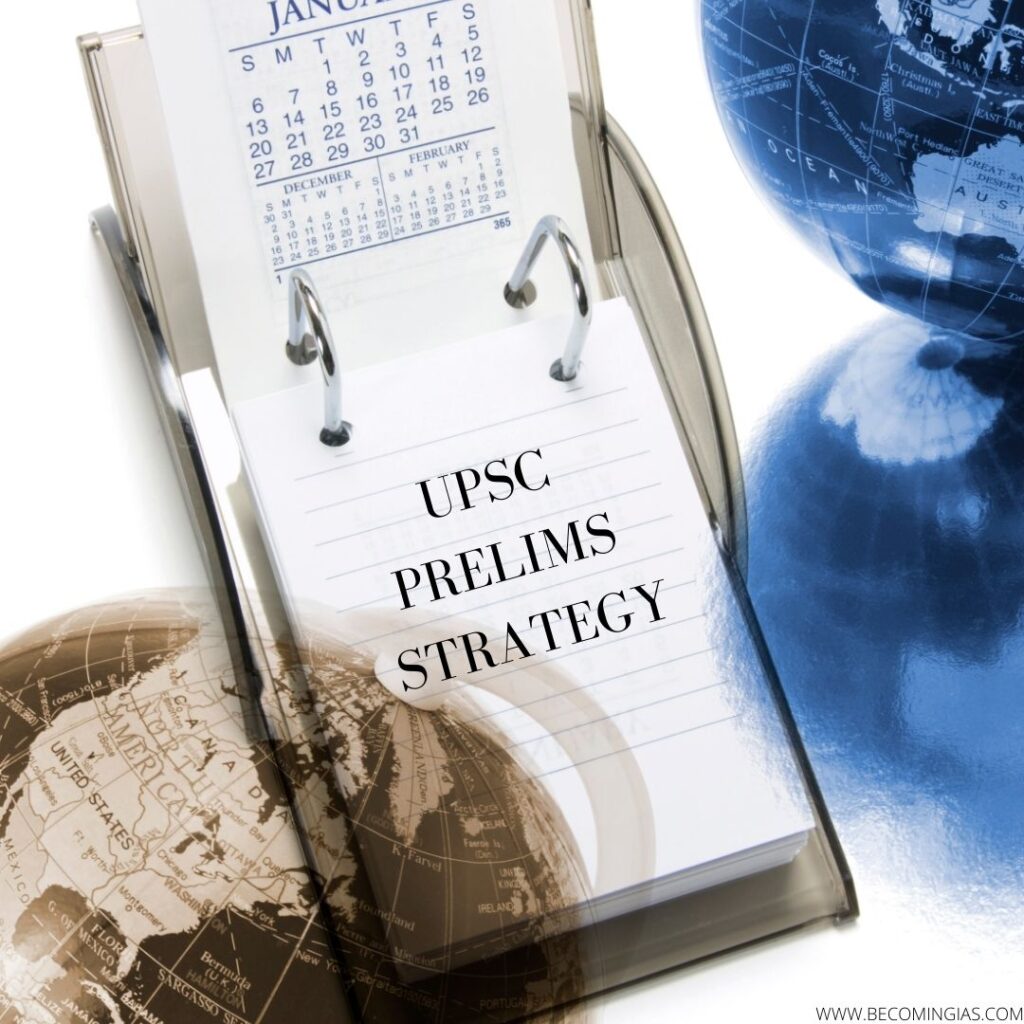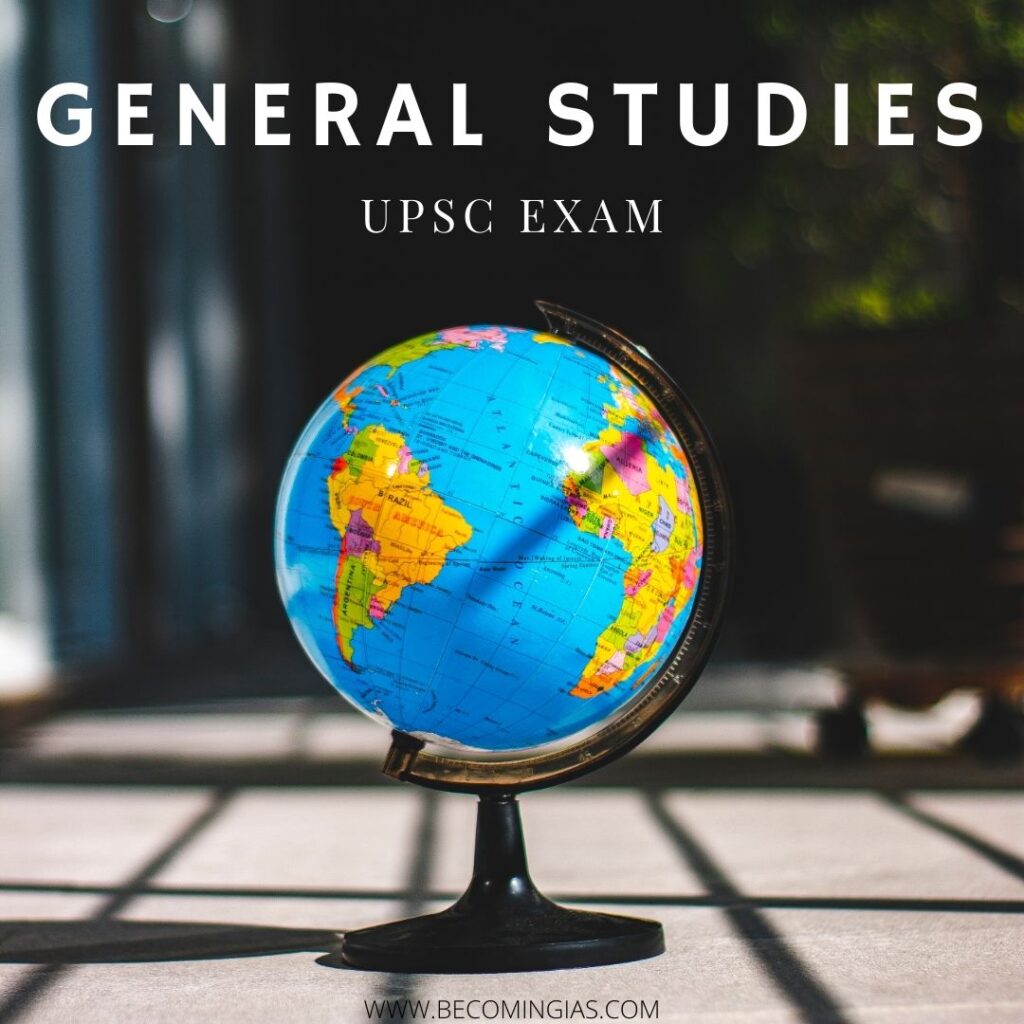-By Shri Amit Kumar Singh, IRS
In this post, I am putting forth an action plan to consider for all aspirant who wish to attempt the UPSC Prelims in 2021 for the Civil Services examination.
This is an opportune time to publish this article because the UPSC has already issued the examination calendar for 2021 wherein the UPSC Prelims is scheduled to be conducted on 27th June 2021 which is more than 200 days away.
While this may seem like a lot of time but that would be mistake.
Consider that current events from almost 18 months prior to the examination date are covered along with the various other subjects such as History, Geography, Polity, Environment and Economy.

Add to this the CSAT and the fact that the gargantuan Mains exam will appear just a few days after the Prelims exam and you begin to realize the shortness of time very palpably.
Once you reverse-engineer all that you must cover for the exam, you realize that in reality, the time available to you for UPSC prelims is rather short.
With these facts in mind, let me put forth a few important points for you to consider before you delve deep into your preparation for the prelims exam.
STEP 1: UNDERSTAND THE GATEKEEPER WHICH IS THE UPSC
The UPSC is a gatekeeper. Your job is to get past the gatekeeper to the life of your dreams in the Civil services. But to get across, you must survive the tests of the gatekeeper which is set to filter people and select those worthy enough to pass through.
I am suggesting to you that instead of only focusing on the UPSC prelims or Mains exam, take some time to focus on the Tester and understand the fundamentals upon which the UPSC functions.
By understanding the limitations and mandate of the tester/gatekeeper which is the UPSC, you can get insights into the test itself. And possibly many clues about how to crack it.
It is important to understand that the UPSC is a constitutional body which functions according to a strict legal mandate guided by formal rules and regulations.
This means that the the UPSC will always source its examination questions from credible, official and government sanctioned sources of information. In fact, they have no other other choice but to do so.
In other words, the UPSC is by it’s own mandate, restricted to official sources of information. These include Annual reports of ministries, publications from International organizations such as the United Nations, official press releases by PIB etc.
Notice that the reason the NCERT is so highly recommended as a source of study for the UPSC exam not because of the quality but the official status of the contents therein.
The NCERT books are the government sanctioned and prescribed versions of knowledge to be imparted to students in India which is why you find questions in the UPSC exam being sourced from them.
STEP 2: CHOOSE YOUR SOURCES VERY WELL FOR THE UPSC PRELIMS EXAM
With the internet flooded with information about all topics imaginable, how will you decide what is worth paying attention to for clearing the UPSC prelims exam?
Filtering and selecting good sources of information is critical. You should consider content quality and source credibility while selecting what and who you pay attention to.
There are multiple ways to do this. One option is to limit the number of sources. I would suggest you should have no more than 3-4 sources for current affairs for the UPSC prelims exam.
Another way is to limit time spent on looking for new sources. You can do this by installing the StayFocusd plugin for Google Chrome.

Covering current affairs is one of the most challenging parts for the UPSC Prelims exam. One of the main reason for the difficulty is that most aspirants do not rely on authentic and reliable sources of information.
You should take your time in choosing your sources before you start preparing in earnest. You may need to analyze different newspapers, current affairs magazines and websites and narrow down to maximum one newspapers, two magazines and two online websites to rely for all your current affairs sources.
The criteria to decide these sources will vary based on how you like to consume information. For what it’s worth, you will realize after a while that all sources of information are ultimately tied to a few master-sources.
These master sources, as mentioned earlier are official government websites, other inter-governmental forums like the United Nations and some highly credible news outlets.
So, basically these so called current affairs magazines and websites are simply acting as funnels to streamline information to you.
Some may be giving out long detailed articles covering every aspect of the news , others may be providing it in a neat tables, even other may be relying on info graphics to convey information.

You should decide which form you like best to consume information.
Once decided, you should stick to your sources and not go out looking at every other source just because they contain a few details which were not covered by your source.
Know that you will never be able to cover exactly all the current affairs eventually asked in the examination even if you follow all the magazines and website, so is the nature of questions asked in UPSC Prelims.
But what you can be sure is that if a question is asked from current affairs then you have read something about it. What you have read should be sufficient for you to do intelligent elimination of given choices to arrive at the right option.
Once the sources are well chosen, you still have a few months to dive deep into the UPSC Prelims exam.
STEP 3: ALLOCATE TIME FOR MAINS ANSWER-WRITING
If you just prepare for prelims exam the whole of the remaining 200 odd days you may find that while you have cleared prelims exam you are not actually prepared for the actual examination i.e. Mains exam.
Make sure that you keep at least 2 days every week to practice answer writing for mains also. You cannot expect to just overnight acquire the skills for mains answer writing after prelims is over.
It will be a continuous and time-consuming learning process to learn how to write well but this can be made drastically easier by using the cheat codes, hacks and tricks listed in the Ultimate Cheatbook.

You should utilize the time before prelims to prepare for mains answer writing also. Every week you should pick different questions asked in previous years and write answers to them in a time bound manner.
The Ultimate Cheatbook by Ravi Kapoor, IRS is the shortest and most efficient way to get the most out of your time for answer-writing in the Mains exam.
You can read more about Essay and answer-writing in this free Cheat-sheet.
This will give you exam conditioning. You will initially find that even for question which you know the answer it is not easy to articulate them within give word and time limits. Hence, it is of paramount importance that answer writing practice is done through out out your preparation.
STEP 4: STRATEGYZE TO COVER THE STATIC PORTIONS OF GS FOR UPSC PRELIMS
Static portion for UPSC Prelims would be History, Polity , Geography , Economy and Environment questions which are not current based or analytical.
Remember that not all questions asked on these topics would be called static. Many questions on them will be coupled with current affairs or might be analytical/theoretical in nature.
By Static questions I mean those which are simply fact based questions. You will either know the answers to them or you won’t. There is usually no intelligent elimination involved with them.
The trick to cover static portion is again to find the right material. I suggest you should read one standard text like NCERTs or other standard books ( like Goh Che Leong for Geography, LaxmiKanth for Polity etc.) and read it repeatedly until the content is imprinted in your memory firmly.

While going through a topic, try to understand all the concepts involved. You should try to remember all the facts given in the standard texts. Even those given in footnotes ( For example in NCERT books) .This will ensure that you do not miss out of easy full tosses, if any, thrown at you in the UPSC prelims exam.
Now once you are through with the standard concepts and facts you should try to improve only your factual database. There are many books and online material available which give out topic wise factual data. The trick here is to just go for the facts and not to erode the foundational conceptual understanding which you have gathered from standard texts.
Remember that the key here is to ensure that you do not miss out on any easy to medium difficulty level static questions. If you miss out on these then you will most likely fall behind in the competition.
Be rest assured that if, in the exam, you are finding the static facts asked difficult then it must be difficult for majority of other candidates as well. You can then simply chose to skip such questions with confidence without falling behind to the competition.
Just like current affairs, you will never be able to cover everything in the static portion (History question asked in UPSC prelims are a case in point) but you need to feel confident that if you can’t answer a static question then most of your competitors also can not.
In a nutshell, the extra difficult questions in the UPSC prelims will not hurt your chances of clearing the prelims but the making a mistake in the static and easier questions most certainly will.
STEP 5: HAVE A PLAN FOR CSAT FOR UPSC PRELIMS
One of the biggest pitfall in your UPSC preparation will be the CSAT paper if you ignore it. Being a qualifying paper it does not get the same importance as the general studies paper for prelims. Most aspirants look towards CSAT only a month or so before the exam.
This is a risky approach. You may need a lot of practice to get required marks in the CSAT paper. With all the preparation for general studies paper you would not like to fall behind just because you did not give due importance to the CSAT paper.
Remember there are no current affairs or new topics to be learned for CSAT. All that is to be studied for it is already available to you right at this moment.
I suggest you finish off CSAT and practice it more and more in coming months. Having done that you will feel super confident when the prelims pressure would start to mount.

The ideal way to prepare CSAT is to complete its core area NOW. Yes, months before the examination you should cover all the CSAT topics and start practicing them on a weekly basis.
In the last days before the prelims you will be able to fully focus only on the general studies paper and just practice what you have already done for CSAT paper.
You should solve all the previous year CSAT papers atleast 3 times in a time bound manner and carve out your own strategy to ensure that you get the minimum required marks in CSAT.
Remember you need to be very smart while attempting the CSAT paper. You should not attempt too many or too less questions. You need to figure out the optimum number of questions which you should attempt to cross the CSAT hurdle.
STEP 6: DECIDE ON FRINGE AREA STRATEGY
I call fringe areas for prelims the topics such as science , international affairs , sports, personalities , awards etc.
These are the topics on which questions asked vary over the years. For these topics you should find out crisp and reliable sources such as government websites, united nations sources.
Again like the static portions, you should not be afraid of UPSC asking some random award which no one has heard about. You should try to cover optimum information so that you know the well known or current affairs related details.
If a random detail is asked by UPSC then you always have the option to skip that question confidently if you can be certain that it is just a curve ball that UPSC has thrown and most of the competition will also be stumped.
You should prepare good notes from right now on these fringe topics to be revised before the exam. The notes should be optimal and not fully of every detail you can find out. Be smart in your notes for these fringe topics.
I hope with the above strategy points in mind , if you start preparing sincerely and smartly for UPSC Prelims 2020 then you will surely clear it and also be well prepared for the UPSC Mains 2020 thereafter.
I hope this helps!
Tc and stay healthy.
rtp slot rtp slot legianbet slot gacor bosku bandar togel bakautoto slot gacor bakautoto toto slot situs toto slot gacor bakautoto bakautoto toto slot bakautoto toto slot toto togel toto slot situs slot gacor slot88 legianbet legianbet rtp live toto slot situs slot situs toto slot gacor bakautoto bakautoto legianbet toto macau
Sir I am in collage and I want to start preparation for upsc but I am totally confused about books or sources.please guide me how can I start preparation in a effective manner
Two times I failed to clear prelims.I think these time your guidance help me in clearing exam.
I certainly hope so. Do check out the Ultimate Prelims Cheat sheet and use the answering strategy mentioned therein.
All the best,
Ravi